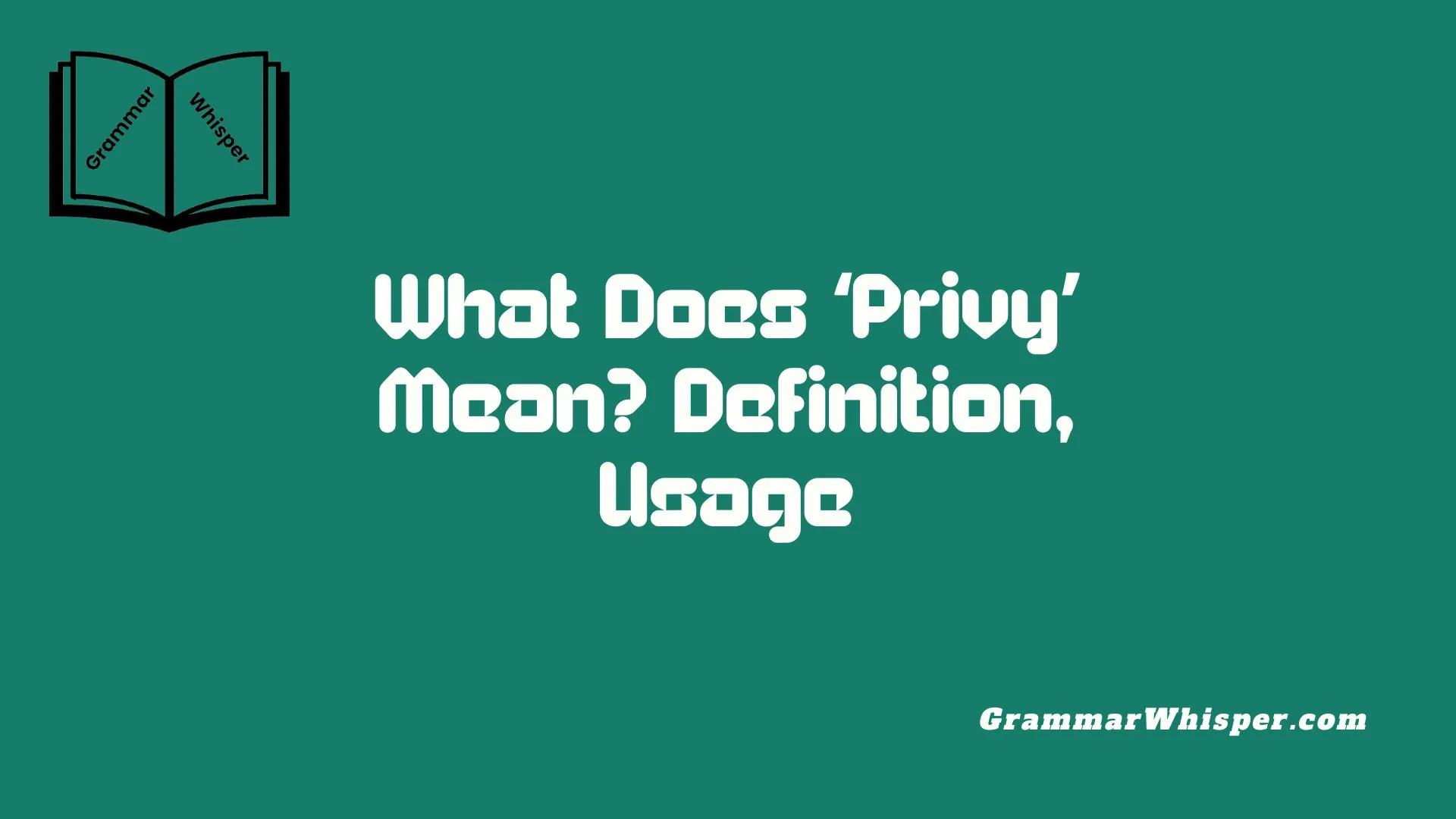In the world of English, certain words quietly hold secrets from the past centuries, keeping history alive through a nuanced meaning and precise usage. The letters in privy may look simple, but this term has a rare, slightly old-fashioned feel that makes it special in legal, political, and social conversations even today. When I read literature or sit in courtrooms, I often notice how this word carries weight in specific ways, trusted deeply to say exactly what people mean.
When I teach students, I always encourage them to take a deep dive, explore everything, and truly know what privy means, where it came from, how it’s used, and why its roots matter in our modern language. This tiny word reminds me that choosing the right word shapes how we connect across time. It proves that in a changing world, old words can stay powerful and precise if used wisely.
Understanding the Core Meaning of ‘Privy’
At its core, “privy” is an adjective meaning to be informed about something private or secret. If you’re privy to a piece of information, you’ve been granted access to details that are not known to everyone else.
Here’s a basic breakdown:
- Word type: Adjective (also used historically as a noun)
- Modern meaning: Having knowledge of something confidential
- Tone: Formal, often legal or professional
For example:
“Only senior executives were privy to the acquisition talks.”
Being “privy” means you’re in the inner circle – not just overhearing information, but being directly included.
The Etymology of ‘Privy’: From Latin to Legalese
The word “privy” has a long and well-documented etymology.
| Language Stage | Word Form | Meaning |
| Latin | privatus | Private, personal |
| Anglo-French | privé | Belonging to one person |
| Middle English | privy | Secret, private knowledge |
It entered English around the 13th century, often connected with private matters of the state or monarchy, such as the Privy Council in the UK – a body of advisors to the sovereign.
Privy as an Adjective: Usage in Contemporary English
In today’s English, “privy” appears mostly in formal, professional, or legal language. Here’s how it functions:
Common Meanings
- Having access to confidential information
- Being aware of something not publicly shared
Common Phrases
- Privy to a conversation
- Privy knowledge
- Made privy to the details
Examples in Context
- “He was not privy to the board’s decision.”
- “As a legal counsel, she’s privy to sensitive case files.”
The adjective form is often paired with “to,” forming a prepositional phrase.
Legal Context: ‘Privy’ in Contracts, Courts, and Property Law
In legal settings, “privy” holds a very specific and technical meaning. It refers to a party that is directly involved in or affected by a legal contract, agreement, or litigation.
Legal Examples
- Privy to a contract – A party involved or bound by the terms
- Privity of estate – A relationship between parties in a real estate agreement
- Privy party – Someone with direct interest in a case
Famous Case Reference
In the landmark case Tweddle v. Atkinson (1861), the court ruled that only parties privy to a contract can sue to enforce it. This principle laid the groundwork for the doctrine of privity of contract in common law.
Privy as a Noun: Obsolete and Historical Usage
Though rarely used today as a noun, “privy” once referred to a toilet or outhouse, particularly in medieval and early modern England.
Historical Uses
- Privy chamber – A royal’s private apartment
- Privy Council – A secret council for the monarch
- The privy – An outhouse or small outdoor toilet
Literary Examples
- “He retreated to the privy at the edge of the courtyard.” – (Medieval fiction)
- Shakespeare and Chaucer often used “privy” in contexts denoting secrecy or private space.
Practical Examples of ‘Privy’ in Sentences
| Form | Example Sentence | Context |
| Adjective | “She was privy to the merger details.” | Corporate/business |
| Adjective | “Only the committee chair is privy to that report.” | Government |
| Noun (historical) | “The guards stood outside the privy chamber.” | Historical/literary |
| Legal | “The tenant is privy to the lease terms.” | Property law |
These examples show how flexible and layered the word can be depending on the context.
‘Privy’ in Literature and Media
Writers throughout history have used “privy” to convey secrecy, closeness, or exclusivity.
In Literature
- Jane Austen in Emma: “She was not to be made privy to his plans.”
- George Orwell in 1984: The idea of being “privy” to secret state decisions shows up often in totalitarian themes.
- Charles Dickens in Bleak House: “Sir Leicester was not privy to the servant’s indiscretions.”
In Media
- In TV dramas like House of Cards, characters use “privy” to refer to backdoor dealings.
- Films with royal or courtroom settings frequently use the word to add authenticity.
Related Terms: Synonyms, Antonyms, and Near-Equivalents
| Type | Word List | Notes |
| Synonyms | Informed, aware, included, inside, apprised, clued in | Use depending on tone and audience |
| Antonyms | Unaware, excluded, ignorant, oblivious, left out | Useful for contrasting sentence structures |
| Legal Equivalents | Party to, stakeholder, signatory | Contract-specific terminology |
When to Use ‘Privy’ (and When Not To)
Appropriate:
- Legal writing
- Formal emails or statements
- Professional reports or analyses
- Historical fiction or period writing
Avoid in:
- Casual speech: Instead of “privy to,” say “in the loop” or “aware”
- Informal emails or blog content
- Everyday conversation, unless for effect or irony
Using “privy” in the wrong context can make you sound dated or overly formal, so choose your register carefully.
Final Thoughts
Despite its formal tone and legal roots, “privy” remains relevant today. It represents concepts of trust, access, confidentiality, and involvement – all of which are central to how relationships, companies, and governments operate.
Understanding the term empowers you to:
- Write with more precision in legal, academic, or business contexts
- Decode historical texts with greater clarity
- Recognize power dynamics and privacy in language
In a world increasingly concerned with who gets access to what, being “privy” is still a status symbol – even if it’s just within a team chat or confidential memo.
FAQs
What does “privy” mean in simple terms?
It means having access to private or confidential information. If you’re “privy to” something, you know something that’s not public.
Can “privy” be used in casual conversation?
Technically yes, but it sounds formal. You might say, “He’s not privy to our weekend plans,” but “He doesn’t know” sounds more natural in casual talk.
What’s the difference between “privy” and “privity”?
“Privy” is an adjective or noun referring to a person or place. “Privity” is a legal term meaning a relationship recognized by law, especially in contracts.
Is it still common to use “privy” in writing?
Yes, particularly in formal, legal, academic, or governmental writing. In everyday conversation, people often use simpler alternatives like “in the loop” or “aware.”
Was “privy” ever used to mean bathroom?
Yes. Historically, “a privy” meant an outdoor toilet or outhouse. This usage is now rare but may appear in historical fiction or architecture.











